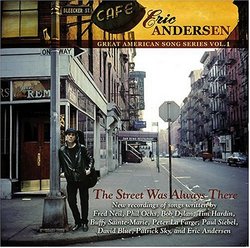Enduring songs from an American moment
Jerome Clark | Canby, Minnesota | 09/27/2004
(5 out of 5 stars)
"Next to Dylan, Eric Andersen remains the most artistically vital performer to emerge from the legendary Greenwich Village folk scene of the 1960s. That's not only because -- unlike such as fellow talents as Fred Neil, Dave Van Ronk, Phil Ochs, David Blue, Tim Hardin, and Tim Buckley -- he's still alive; perhaps more to the point, it's because Andersen is still consumed with his muse. Though his approach remains based in the modern-folk sound created in those heady years (and I have not a single objection to that), he has an appealing way of putting that sound into unexpected but unforced more contemporary sonic textures.
Besides being a very fine singer, Andersen is an exceptional (if sometimes remote) songwriter. Here, however, he looks back to old days and old friends, reviving songs written mostly by others when he was prowling Village streets with Ochs, Dylan, and that fabled outlaw gang. Rock and hip-hop producer Robert Aaron doesn't attempt to recreate their original sound -- which in any event would be pointless since the first-draft versions are easily available -- but sets them under a shimmery folk-rock sky; at moments one could almost swear one is hearing voices accompanied by the aurora borealis. Throughout, Andersen's vocals treat the material, much of it bluntly political, with fierce, even unsettling conviction. Such moral urgency, encountered in an age too often defined by cruel indifference and brutal self-righteousness, is shocking, but it is more than welcome. Most of all, however, these are -- happily -- songs, not sermons, and entirely satisfying on that level.
I have heard nearly all of these songs for what seems like nearly all of my life, though in fact they first passed through my ears when I was a college student in the mid-1960s. Ever since, whenever I've heard somebody spout piously about the Great American Songbook, I've wondered why he or she never seems to have these songs in mind. In his section of the liner notes, producer Aaron -- to whom these songs were new when Andersen brought them to him -- wonders the same. Surely the equal of any written in the past century, these songs document a magical moment, an all-too-short one when older tradfolk-music forms entered a brave new world torn by change, war, and wild new possibilities and refused to blink. A handful of artists, acoustic guitars in hand, found their voices and sang for themselves and the ages.
Smartly conceived and ingeniously executed, The Street Was Always There does them proud. It takes their art to a new generation that will find it needs that art more than ever."
I don't know what took me so long, but this is a gem
o dubhthaigh | north rustico, pei, canada | 10/24/2005
(5 out of 5 stars)
"First off, I'm a long time Eric Andersen fan. Long time. Walked through 3 feet of snow on Bloor Street one winter's night in Toronto in '75 to hear Eric play before maybe 20 people (not his fault, blame the shinook that blew in). And would do it again in a heartbeat.
For some reason, thinking this might be just a throwback spurred on by Appleseed, I avoided this disc. I like Eric's songs. Man was I wrong. This is simply terrific, from the opening Fred Neil track to the closer. It pays homage to colleagues Eric knew in the Village days, while at the same time breathing fire into worthy tunes, thanks mainly to the superb guitar work by Eric and Pete Kennedy.
Eric often felt Dylan dealt Phil Ochs more than one underhanded blow in the course of their careers, and so Phil's "I'm not marching anymore," features a brilliant arrangement with Patrick Sky on uillean pipes to restore this moving song to its rightful place in the American folksong tradition. Fellow Canadian songwriter Buffy Saint Marie has her "Universal Soldier" delivered with a passion that doesn't just resonate these days, it demands attention. Funny how so much of the material here is so to the point of the duplicitous nature of US society. Maybe more so now than back in the day. The Roman Empire is starting to teeter. Some would say, it's got it coming. Eric simply points out where they left their conscience and leaves it to the denizens to decide to revive or decline. In that respect, as social and political commentary, Eric has released a profound gem, worthy of Plato's dialogues.
It is the notion of dissent that Ochs embraced as key to the American concept of democracy. The fascist element in power now would tell you that Ochs is unpatriotic. Hopefully, with the advocacy of Patrick FitzGerald in the CIA-leak case, treason will be unmasked where it lies. In the meantime, this is a disc whose merits ought to be mulled and discussed. It is a work of brilliance from a thinking poet, honouring those who were his comrades in thinking."


 Track Listings (14) - Disc #1
Track Listings (14) - Disc #1